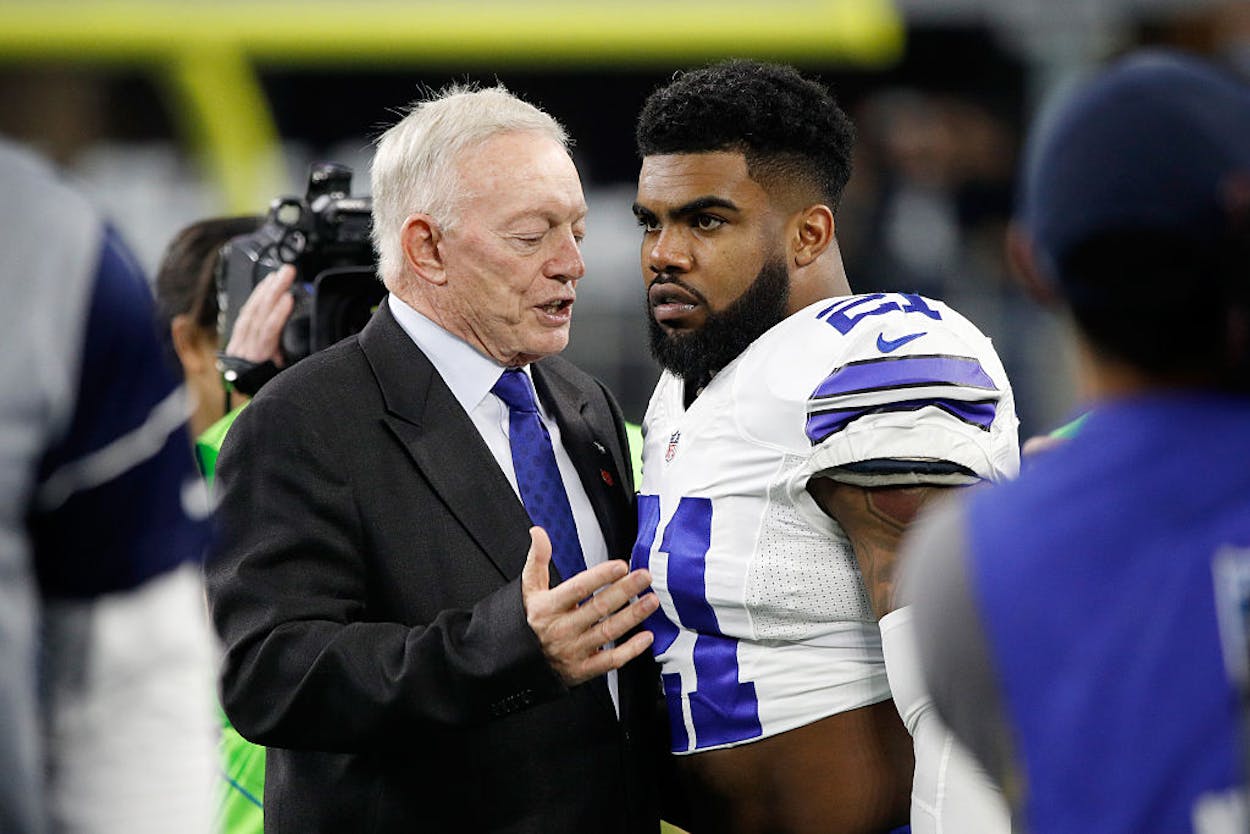Ezekiel Elliott, who the Dallas Cowboys selected with the number four overall draft pick in the 2016 draft and went on to lead the NFL in rushing during the course of the season, was suspended for the first six games of the season on Friday. Jerry Jones is, reportedly, furious.
The suspension stems from domestic violence accusations made by Elliott’s ex-girlfriend. Prosecutors in Columbus, Ohio, declined to pursue criminal charges against the player, but NFL rules don’t require criminal prosecutions to find players in violation of the personal conduct policy. There are a lot of complicating factors here—Elliott was involved in other incidents that raised questions about his character earlier this year, while a witness claimed that the woman who made the allegations asked her to lie about the charges—which means that there’s a lot to unpack.
What exactly is Elliott accused of?
Last summer, a woman posted photos on Instagram of bruises that she said were the result of abuse. She wrote that it had been happening for months, and said that it had culminated in being choked and thrown across the room. She was Elliott’s girlfriend, and in a subsequent post, she tagged the rookie running back.
The same day as the posts, two police reports and a 911 call were released by the Columbus Police Department. The reports are inconclusive—because Elliott and his then-girlfriend had different views of the situation, officers referred her to the prosecutor’s office and did not make an arrest. In the 911 call, which you can listen to here, the woman says that though she had called earlier and intended to report to police the following day—after Elliott left—she was calling back now. She told police on the phone that she had been assaulted by Elliott multiple times over five days.
Why didn’t police pursue charges?
The Columbus City Attorney’s Office said that it declined to file charges “primarily due to conflicting and inconsistent information across all incidents resulting in concern regarding the sufficiency of evidence to support the filing of criminal charges.” There’s no conclusive way to know exactly what is being referred to, but one thing that has been seized upon is that, allegedly, his ex-girlfriend asked a friend to lie to investigators. Documents released after the city attorney’s office declined to pursue charges included an affidavit to that effect, as well as text messages sent by Elliott’s ex-girlfriend in which she says, “If they ask he dragged me out of my car.” According to the released texts, her friend later asked, “Do you want me to lie about what happened that night bc zekes lawyer is about to call me again [sic].”
Why did the NFL suspend Elliott if prosecutors didn’t have enough evidence to pursue charges?
Prosecutors will bring charges if they believe that they have enough evidence to secure a conviction—which means that they need to believe they’ll be able to convince a jury beyond a reasonable doubt that the charges are accurate. That’s a high burden of proof, and for good reason—criminal convictions can result in prison sentences. The NFL doesn’t have that same burden of proof, so they can conduct their own investigation to determine independently if they believe that Elliott violated the personal conduct policy. In this case, it seems that they did.
The NFL, according to the letter it sent Elliott about the suspension, conducted a thorough investigation. The league’s office said that it interviewed “more than a dozen” witnesses, examined “thousands” of text messages, photographic and digital evidence, and consulted two independent medical experts to determine the nature of her injuries. In the course of that investigation, the league—in consultation with four experts including two former prosecutors, a domestic violence expert, and NFL Hall of Fame Ken Houston—who followed his playing career with two decades of working as a counselor in Texas public schools—found enough to suspend one of its biggest stars.
The letter to Elliott explains that the suspension wasn’t rooted solely on his ex-girlfriend’s statements. Rather, all of the findings were supported by expert testimony, photographic and forensic evidence, and conversations with the prosecutors who declined to indict (who told the league’s investigators that “we generally believed her for all of the incidents”).
Why did Elliott get suspended for six games when Ray Rice only got two games?
The NFL changed its domestic violence policy after footage of Rice’s assault incident was released. In August 2014, the league mandated a six-game minimum suspension for domestic assault, and Rice was eventually suspended indefinitely. The longer answer is that the NFL has been inconsistent in addressing domestic violence allegations. New York Giants punter Josh Brown was suspended for only one game last year despite similar allegations, and the league has never adequately explained the decision not to observe its own policy in that case. That probably strikes Cowboys fans as unfair—and understandably so—but the policy that went into place following the Ray Rice suspension is important. Choosing to ignore it for Elliott just because it was ignored for Brown wouldn’t really represent justice. It would just be the NFL failing to meet its standards.
Can Elliott appeal?
Yes, and he already has. That appeal will be heard by either NFL Commissioner Roger Goodell or someone that he appoints to hear it. That person can reduce, or overturn, the suspension. If they don’t, Elliott can also file a legal challenge, like Tom Brady did in the Deflategate case. Doing so could stretch out the timeline on the suspension for a while—it’s possible, if Elliott maneuvers himself in the courts, that he’d end up playing the full 2017 season and serve his suspension, if it stands, later on. It’s hard to know for sure what happens next here. It’s rare that a suspension like this is overturned, but the odds are that this will be the start of a fairly long process—not the end of one.








